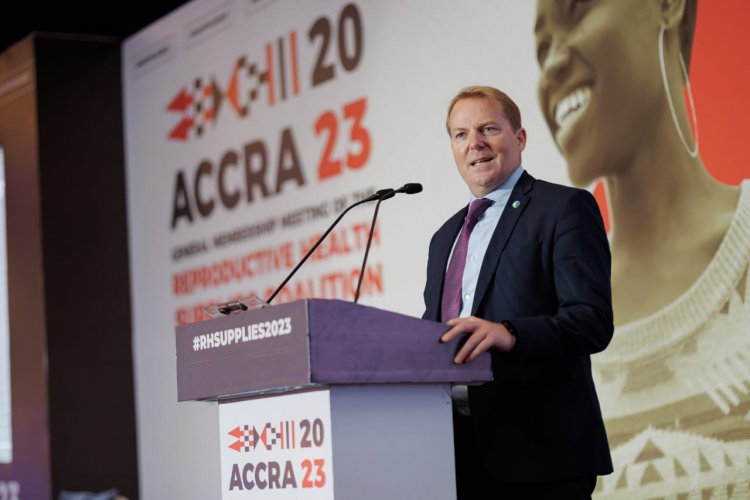Institute measures to mitigate RH products manufacturing challenges -African Leaders told
This, the Coalition believes will reduce the cost of the products and make it easily accessible to both adolescent women and men thereby reducing future unforeseen circumstances.

African countries who are members of the General Membership of the Representative Health Suppliers Coalition have been tasked to level out all challenges impeding the production supplies of Reproductive Health Products.

This, the Coalition believes will reduce the cost of the products and make it easily accessible to both adolescent women and men thereby reducing future unforeseen circumstances.
He made the call in an interview at the sidelines of the General Membership Meeting of the Reproductive Health Supplies Coalition on Thursday, 19 October 2023 in Accra.
The Coalition which is made up of Reproductive Health Supplies, a group that has a vested interest in assessing the overall impact of a pandemic on money, markets, and movement is holding a five-day experience-sharing event.
Participants at the 5-day event will be seeking to draw vital lessons from the sector's response, and celebrating what it termed, "Unique Resilience".
Players at the meeting will seek to explore the many faces and facets of resilience within the Reproductive Health(RH) community and its ability to persist, create, and innovate in the face of great challenges.
Great lessons will be drawn from personal and professional stories of resilience shared about disruption, adaptation, innovation, and resilience throughout the supply chain.
Making the call on African Governments, Martyn Smith, the Director, of the Reproductive Health Supplies Coalition(RHSC) believes that if African governments heed the clarion call, reproductive health products will be accessible at affordable prices.
Talking about policy gaps within African governments in terms of the supply of reproductive health products, he said Kenya for instance is well structured on a good trajectory by committing itself to pay for all reproductive supplies by 2026 while others have limited fiscal space to mobilize resources.
He disclosed that Asian countries such as Indonesia and India pay for reproductive health supplies from domestic sources, a situation that used not to be the case some years ago.
The RHSC Director underscored the need for countries to develop a sense of what he termed, "realism" as to how fast countries can move.
Talking about policy gaps within African He however, believes that Ghana has shown a spectacular role in response and handling of the COVID-19 pandemic by making reproductive health products available. He appealed for countries showing commitment in that regard to be supported in their transition of making reproductive health commodities more strategic critical commodities and ensuring that access to commodities is prioritized.
He said menstrual health products in West Africa have always come up at their meeting. According to him, aside from heavily taxing menstrual products in West Africa lack of access to menstrual health products must be addressed.
He said the disruption during 2021/2022 of the supply chain during the pandemic calls for the need to play the long game.
"We need to play the long game here. We need to understand that it's going to talk about a lot of small steps where Ghana, Nigeria Kenya, or South Africa can produce menstrual health products at affordable cost and supply them to other countries but that is a dream that can be made to come true with the right measures and political will in place", he added.
As to whether African countries have the political will, he said Ghana in his view has. He said the Coalition believes access to menstrual health products is a right and therefore urged that one stands firm in ensuring it is achieved.
He opined that the birth of the African medicine agency established by the African Union has a crucial role to play in the manufacturing of reproductive health products.
Dr Claudette Diego, the Logistics and Supply Manager at the Ghana Health Service said though there were financial and logistical challenges, the Ministry is committed to ensuring the availability of Reproductive Health Services.
According to her, the ministry regardless of the aforementioned hiccups, has embarked on a sensitization drive on reproductive health issues.
GHS, she disclosed continues to provide services with a focus on child maternal newborn, child adolescent reproductive health and nutrition have been the main focus and has indicated the ministry's resolve to upscale same.
She said in terms of the ministry's resilience in the face of challenges, it continues to provide such services available and accessible during and post covid 19.

 Prosper Kwaku Selassy Agbitor
Prosper Kwaku Selassy Agbitor 


































